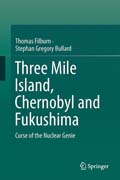
Three Mile Island, Chernobyl and Fukushima
Filburn, Thomas
Bullard, Stephan Gregory
This book examines the three most well-known and socially important nuclear accidents. Each of these accidents had significant, yet dramatically different, human and environmental impacts. Unique factors helped shape the overall pattern and scale of each disaster, but a major contributing factor was the different designs used for each reactor. Fukushima was a boiling water reactor (BWR), Chernobyl was a graphite moderated boiling water reactor, and TMI was a pressurized water reactor (PWR). This book traces the history of nuclear power and the development of each reactor type. We examine how GE’s work with a sodium cooled design did not fare well with the US Navy, and led GE to promulgate the BWR design. We explore the Russian atomic bomb program, its use of graphite moderated reactors, and their design modifications to create power production units. We trace the developments in the US that led the US Navy to select the PWR design, and caused the PWR to be used for nearly 2/3 of all US commercial reactors. In sum, the book uses the three major nuclear accidents as a lens to trace the technological history of nuclear energy production and to link these developments with long-term societal and environmental consequences. The book is intended for readers with an interest in nuclear power and nuclear disasters. The detailed and compelling account will appeal to both the expert and the interested lay-person.
- ISBN: 978-3-319-34053-1
- Editorial: Springer
- Encuadernacion: Cartoné
- Páginas: 120
- Fecha Publicación: 10/12/2016
- Nº Volúmenes: 1
- Idioma: Inglés
